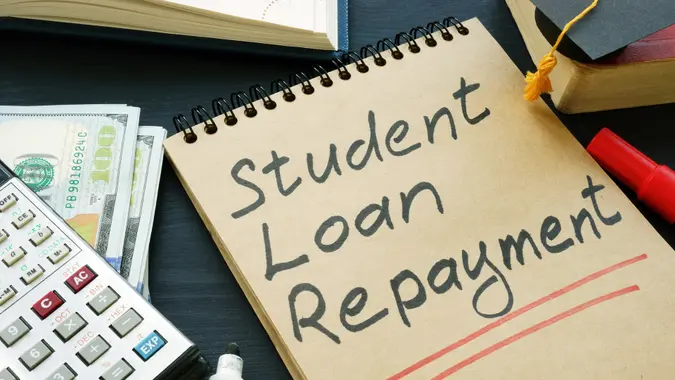Reasons You Can or Can’t Be Taxed on Student Loan Forgiveness

Commitment to Our Readers
GOBankingRates' editorial team is committed to bringing you unbiased reviews and information. We use data-driven methodologies to evaluate financial products and services - our reviews and ratings are not influenced by advertisers. You can read more about our editorial guidelines and our products and services review methodology.

20 Years
Helping You Live Richer

Reviewed
by Experts

Trusted by
Millions of Readers
Whether you’ve recently benefited from Biden’s student debt discharges or are on a payment plan that will lead to forgiveness, wiping a large student loan balance can be a big financial relief. But depending on the timing and your situation, the forgiven debt could leave you on the hook for a big tax bill from the IRS and/or your state.
.
Will I Pay Federal Taxes?
Because of the American Rescue Plan Act, you shouldn’t have to pay federal taxes on any canceled student debt if it’s forgiven by the end of 2025. This temporary exemption could potentially save you thousands, especially if your remaining student loan balance is high.
However, once 2026 begins, most forgiven federal and private student loan debt is set to be taxable at the federal level again. According to the IRS, the amount will be part of your gross income for the year it’s forgiven. While you might receive Form 1099-C (Cancellation of Debt) from your lender, you’ll need to report the information even if you don’t.
However, you could still avoid paying federal taxes in certain situations. For example, you’re exempt if you receive forgiveness under the Public Service Loan Forgiveness program or are considered permanently disabled. The same can be true if your school had shut down or defrauded you. Plus, there’s the potential for an extension to the current exemption.
Will I Pay State Taxes?
Even if you can avoid paying federal taxes, you could still face a state tax bill.
While most states follow the federal tax code’s exemption through 2025, Wisconsin, Indiana, Mississippi and North Carolina are among the states taxing forgiven student loans as income. Other states, including California and Arkansas, may eventually decide to tax forgiven student debt as well.
Keep an eye on updates since state tax laws could change before you receive student loan forgiveness. You should also check for any special state exemptions on canceled debt.
Planning Ahead for Your Potential Tax Bill
Preparing now is crucial if you expect an eventual “tax bomb” for canceled student loan debt.
You can run your student loan, income and tax details through a student loan repayment calculator, which may show the expected canceled amount and tax bill. You can use this information to set aside cash for the potential tax bill. Just keep in mind that tax laws and your financial situation could change, especially if forgiveness is years away.
If you do face an unaffordable state or federal tax bill, consider meeting with a tax professional about your options. For example, you might qualify for an insolvency exclusion, try to settle for a smaller amount or set up a payment plan, which often involves penalties and interest.
More From GOBankingRates
 Written by
Written by  Edited by
Edited by 

























